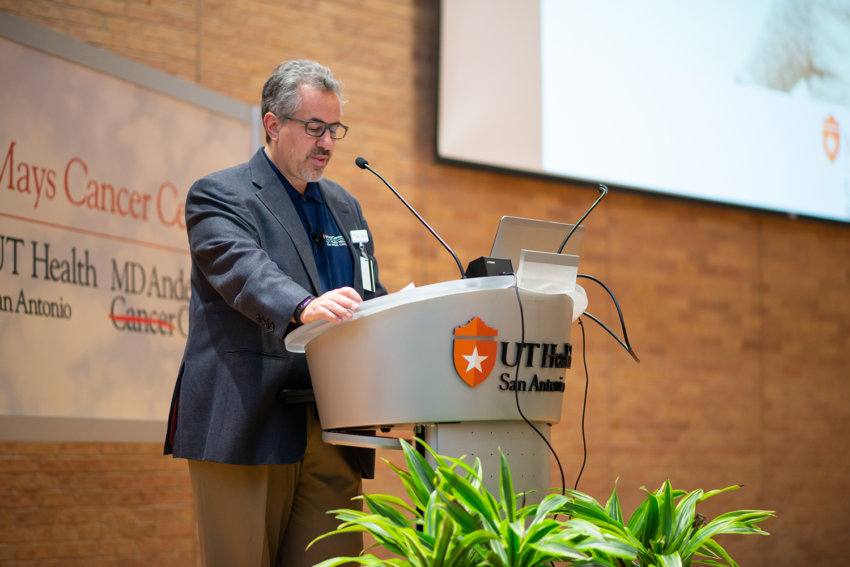The importance of exercise, a healthful diet, prayer/meditation and social support during the cancer journey were some of the take-away messages for participants attending UT Health San Antonio MD Anderson Cancer Center’s inaugural “Living Beyond Cancer A-Z” symposium, held Saturday, Jan. 12.
More than 500 people attended the free event that featured general morning sessions presented by cancer experts, afternoon discussions led by cancer physicians about specific types of cancer, and breakout sessions on support services and coping mechanisms important for the cancer journey.
“We had a fantastic mix of attendees and the engagement of more than 60 faculty members from our cancer center, including specialists from hematology/oncology, medical oncology, radiation oncology, medical physics, cancer surgical specialties and palliative medicine,” said Ruben Mesa, M.D., FACP, director of the cancer center.
“We also had wonderful support and engagement from our colleagues at MD Anderson Cancer Center who joined us for the afternoon disease-specific breakout sessions,” he said.
“Engaging with our community about the cancer journey was the goal of our symposium,” Dr. Mesa said. “This is so important because a cancer diagnosis can be devastating, but cure rates have been going up for most types of cancer. The more you learn about your type of cancer, the better prepared you will be for the journey. And by the journey I mean prevention, diagnosis, treatment, recovery and quality of life after cancer.”
Here are a few highlights from the morning general sessions.
Nutrition
In her presentation, “Nutrition/Recovery,” Laura Tenner, M.D., M.P.H., discussed common dietary misconceptions. Dr. Tenner is an assistant professor of hematology/oncology at UT Health San Antonio who specializes in colorectal cancer.
One misconception is that drinking alkaline water helps fight cancer. She said, “There is no evidence to support this because the body regulates the levels of acidity through the lungs and kidneys.”
Some people believe that hair dye can cause cancer. “There is a study of hair stylists and barbers that showed they had a higher incidence of bladder cancer, but there is no evidence that it causes cancer in the general public,” she said.
Exercise has shown to be a significant deterrent in preventing cancer recurrence. “There have been more than 20 studies that show physical activity helps cancer survivors,” she said. Adults age 18 to 64 should strive for 150 minutes a week of moderate exercise or 75 minutes a week of vigorous activity, she said.
Evidence shows that vitamin supplements are unlikely to improve a person’s cancer prognosis or overall survival. “It’s better to get vitamins through the diet,” she said.
And the best evidence on diets, she said, points to the Mediterranean diet, which focuses on vegetables, fruits and whole grains, and includes more white meat and less red meat, whole fruit instead of juice and olive oil over other types of oil, she said.
Immunotherapy
Tyler Curiel, M.D., M.P.H., professor of medicine at UT Health San Antonio, discussed immune checkpoint inhibitors and upcoming new drugs in his presentation, “Immune System in Cancer.” Immune checkpoint inhibitors are molecules on certain immune cells that help the body tell when the immune response is over and needs to be shut down for safety.
Cancer cells have a way of tricking checkpoint inhibitors into spreading “fake news” to the body’s cancer-fighting T-cells, convincing them that they do not need to fight cancer. However, immune checkpoint blocking antibody therapy helps modify the patient’s T-cells to allow them to fight the cancer. He said several new cancer immunotherapies, including more immune checkpoint blockers and new CAR-T cell therapies, will be available in the next few years.
“Mix of Six”
In their presentation, “Harnessing Lifestyle Change for Cancer Prevention & Control,” Lorenzo Cohen, Ph.D., and his wife, Alison Jefferies, M.Ed., delved deeper into personal choices that can “Make our bodies as inhospitable to cancer as possible.” Dr. Cohen is a professor in the Department of Palliative, Rehabilitation and Integrative Medicine at MD Anderson Cancer Center. Jefferies earned degrees in art history and education and has a master’s degree in educational psychology.
They focused on the “Mix of Six” factors that can decrease the likelihood of cancer: social support, stress management, sleep, physical activity, diet and the environment. Aging and obesity are major causes of cancer, they said. “Close to 80 percent of people in the U.S. are obese, including one-third of children,” she said, which calls for making changes early in life.
Regarding social support they recommended avoiding negativity and finding friends who can provide support at different levels. They suggested people make it a point to become a positive force. “With volunteering, you give of yourself to others. Research says that this reduces mortality by 22 percent,” Jefferies said.
“Stress speeds up the aging process,” they added. Cognitive Processing Therapy, yoga, meditation, humor, a healthy diet, exercise and good sleep help the telomeres, the tips of chromosomes that experts believe control the keys of aging and cancer, from becoming shorter. Finding ways to reduce stress can help preserve good health.
“Sleep drives metabolic clearance from the adult brain,” they said. Good sleep hygiene includes exerting yourself physically during the day, being outside without sunglasses for at least 30 minutes a day and limiting napping to only 20 minutes, they said, adding that a good night’s sleep is between seven and eight hours for adults.
“There is overwhelming evidence that exercise reduces cancer risk,” they said. At work, “Sit less and stand more…Our children put their computers on an ironing board, so they can be raised and lowered” to make it easy to stand while doing work on the computer.


